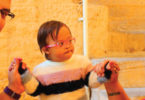My husband and I have four children – all under 5 and a half years. It has been amazing and delightful to see each of them grow into their individual personalities. The youngest is 9 months old right now and little personality traits are already beginning to peek out through her smiles, her desire to meet our eyes, her curious little explorations as she crawls around the apartment.
Each one has shown us how different they are and how we need to approach discipline, attention, one-on-one time, in such varied ways. With each child we’ve had to tweak something in our approach. We learned early on that our eldest learns best when we add an imaginative, fun, creative element to whatever we’re trying to teach her. We learned that our second has a logical mind, loves to build things, and once he gets something, he won’t forget it. Our third, at 20 months, is showing us that he loves physical touch and desperately needs it to stay upbeat. Our 9 month old loves being on the move in order to be close to all the action.
I look at them and I’m amazed at what each one has to offer to our family and everyone around us. When I watch all of them playing in a room together, I don’t see four kids, I see four individuals who each have opinions, preferences, quirks, weaknesses and strengths. I look at them and see that each one means the world to me, no one is more or less than the other.
We’ve taken two very practical and easy-to-implement methods that can teach our children how they should expect to be dignified by others and how they in turn will learn to dignify the “other:”
1. “Good child, bad choice”
Anytime we approach a discipline issue with our kids, we make it a point to tell them that they are NOT bad, but that they’ve made a bad choice. We make sure to reiterate each time that they are good and that we love them very much. This reassures them that each of them is important to us, each one is valued in our eyes and that their actions don’t determine our love for them.
2. “Use your words”
As a method of ensuring they learn that each of them is valued, we’ve set them up to practice “using their words” with each other. When our older two fight, we ask them to talk it out and let each other know 1) what they are not happy about and 2) what they need from each other. The reasoning behind this is to instill in them a habit of listening to the other person and learning how to articulate what it is they are unhappy about.
Helping them practice this will help them learn to truly listen to each other, which we hope, will train them to truly listen to others in the future, a foundational trait for treating others with dignity. While these are two practical steps we use daily, our decision to do so is based upon a fundamental truth about them – that they are full human beings. If we see them merely as a 5 year old or a 3 year old, we limit our capacity to prepare them for a full life and to dignify them. We need to see them both at the age they are at now as well as anticipating when they will be 15, 25, 35, etc. That is the person we are raising, not just the 5 year old. We need to see our children in their entirety.
They are full human beings, with the capacity to feel complex human emotions at different stages of their life, but it is helpful to see them in their “already, but not yet” stages of development. They are already the person they are going to become, they just need our guidance to help them get there. We can help them develop rightly when we keep the end, the goal, in mind. We see who they are now through the perspective of who they are going to be in the future. If we, as parents, constantly remind ourselves that we are not merely preparing them for success today, but also for the future, our desire to dignify them will be second nature and their ability to dignify others will become second nature too.
I think I’ve definitely driven home the point that our kids mean the world to us and that we put great importance on making sure they know they are valued on an individual level.
What if this was how we viewed everyone we came across?
What would our country look like if we looked at the sabzi wala, kabadi wala, mechanic, ayah, bus conductor, police, dhobi, and all the other people that we come across in our daily lives and saw a human being with perspectives, preferences, complex emotions, opinions, weaknesses and strengths. To view them as a valuable part of humanity instead of viewing their worth by what they can do for us and how well they can do it. We all know India is filled with diversity – the key to celebrating that diversity is to celebrate each individual.
This, in my opinion, is what is so important to remember when it comes to diversity on a social, political, and religious level. Each individual on this planet is valuable and equal to the other. Just as my kids are equal to me in their humanity, so should we see others as equal to us. None of us are worth more on a basic human level than anyone else. No matter what our socio-economic status might be, our caste, our religious beliefs, our political stance, the color of our skin – we are each individuals of great worth because, at the end of the day, we are ALL human beings.
Here are some steps to dignify others around you:
Recognize each individual as a valued human being
When you are interacting with anyone, whether it is on the bus, in the market, on the sidewalk, at your office, at home, at a neighbour’s house here’s something small you can do to recognize that they are valued – make eye contact, smile, offer your seat to them on the bus, share a story with them, ask them their name. Look beyond their clothes, color of skin, socio-economic status and engage with the human being that’s before you.
Focus on the positive
Affirmation goes such a long way with people. When it comes to transformation, it is a much more powerful tool than critique. Affirmative words, actions, and attitudes build people up and creates a positive environment that brings peace between people. While critique will always be necessary, it is all too often the preferred method. Affirmation has been proven to be one of the most effective management tools for positive workplace performance. The same is true in the home, marriage and in your friendships. Take time to compliment someone, take time to celebrate an achievement, take time to talk about what they did RIGHT. Recognizing the positive and using positive language to critique the things people can improve on makes a person want to make the change. Focus on the fact that they are already GOOD.
Engage in truly listening
When you are having a conversation where you want to affirm the other individual and bring dignity to them through your conversation, focus on listening and hold back from giving advice and bringing the focus on to yourself. Active listening happens when you “listen for meaning”. As the listener, say very little but convey empathy, acceptance and genuineness. When you listen to what the person said, paraphrase what they said – this means to repeat in your own words what the person you’re listening to said. This helps the other person know that you truly heard and understood what they said.
Recognize the individual identity of each person
It’s easy to make decisions for other people when we begin to think of ourselves as having more worth than them. If we stop and ask others for their opinion or what their preference is, it might actually be different to what we thought was the best option. Know that no matter what our status in society might be, each individual has a right to make a choice that affects them, even if we think we can make a better choice. By giving people the freedom to embrace the right to make their own decisions, we help them to individuate and develop their identity. This shows dignity to your fellow human being.
Choose to see the whole person
Discipline yourself to see people, not by who is in front of you, but for who they are to their family, their community and who they are going to be as they grow and mature. If we only treat people based upon their current station in life, we limit our implicit ability to dignify them and in turn, we ourselves are not dignified. That’s the last lesson, to dignify someone else, and being reciprocal – it dignifies us in return. So whether it is your children, your spouse, a complete stranger or the chai wala, choosing to dignify them in the ways discussed will in turn be your own gift of dignity to yourself.
These are small steps we can take to practice dignifying the “other” which in turn combats intolerance. India is a country where varying hues of diversity exist and where celebrating what’s different about each other is what actually brings us together.






Leave a Comment